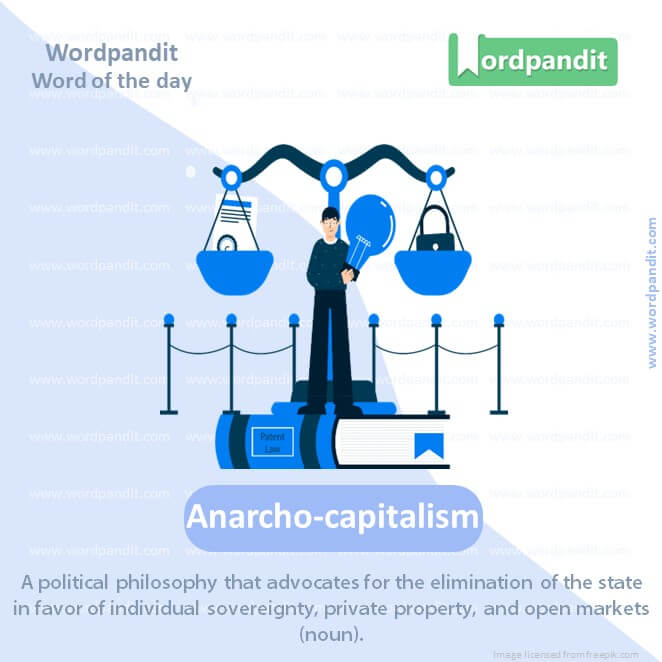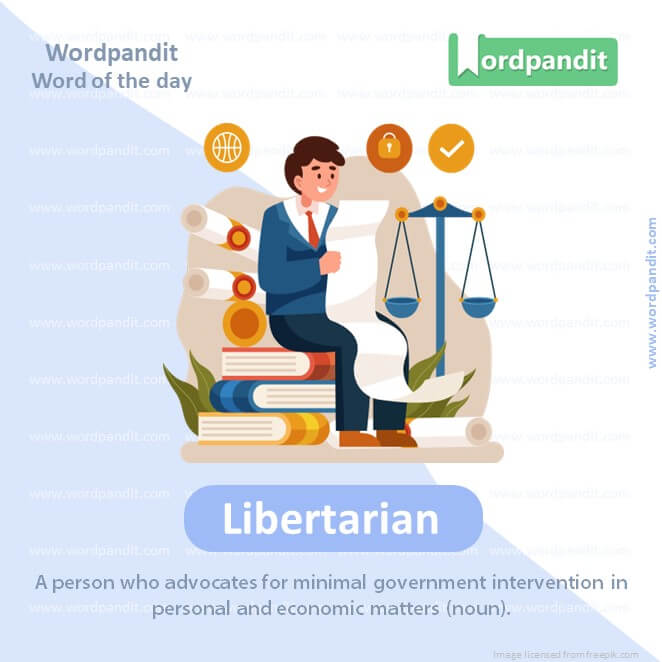Daily Vocabulary Words: List of Daily Used Words in Leading Indian Newspapers
Hi there. Welcome to this special section @ Wordpandit. Our endeavour here is straightforward: highlighting daily vocabulary words that you would come across in leading newspapers in the country. We have included the following newspapers in our selection:
• The Times of India
• The Economic Times
• Hindustan Times
• Mint
• Indian Express
We are putting in extensive work to develop your vocabulary. All you have to do is be regular with this section and check out this post daily. This is your repository of commonly used words; essentially, we are posting a list of daily used words. Hence, this has significant practical application as it teaches you words that are commonly used in leading publications mentioned above.
Visit the website daily to learn words from leading Indian newspapers.

WORD-1: Anarcho-capitalism
CONTEXT: Anarcho-capitalism and libertarian liberalism are political ideologies that promote the principle of limited government involvement in economic and social matters. Individual liberty and limited government are tenets of libertarianism; anarcho-capitalism, on the other hand, advocates for a free market society and the total absence of government.
SOURCE: The Times of India
EXPLANATORY PARAGRAPH: Imagine a big playground where there are no rules set by teachers on how to play or share toys. Instead, everyone decides on their own how to play and share with others. This is a bit like anarcho-capitalism. It’s an idea where there are no strict government rules, and people can do business or trade anything they want without someone telling them what to do.
MEANING: A political philosophy that advocates for the elimination of the state in favor of individual sovereignty, private property, and open markets (noun).
PRONUNCIATION: an-ar-ko-cap-i-tal-izm
SYNONYMS: Libertarianism, Free-market anarchism, Voluntarism, Market anarchism, Stateless capitalism, Individualist anarchism
USAGE EXAMPLES:
1. The book discussed the principles of anarcho-capitalism.
2. She argued that anarcho-capitalism would lead to a more efficient economy.
3. Critics of anarcho-capitalism say it could lead to unfair practices.
4. Anarcho-capitalism emphasizes complete personal freedom and private ownership.

WORD-2: Libertarian
CONTEXT: Anarcho-capitalism and libertarian liberalism are political ideologies that promote the principle of limited government involvement in economic and social matters. Individual liberty and limited government are tenets of libertarianism; anarcho-capitalism, on the other hand, advocates for a free market society and the total absence of government.
SOURCE: The Times of India
EXPLANATORY PARAGRAPH: Think of when you want to play in your way without someone else telling you what to do, as long as you are not hurting anyone. A libertarian is someone who thinks like this. They believe people should be free to do what they want, make their own choices, and not have too many rules from others, like the government.
MEANING: A person who advocates for minimal government intervention in personal and economic matters (noun).
PRONUNCIATION: lib-er-tair-ee-an
SYNONYMS: Individualist, Free-marketeer, Minarchist, Classical liberal, Voluntarist
USAGE EXAMPLES:
1. Libertarians often argue for reducing government regulations.
2. As a libertarian, he believed in personal freedom.
3. Libertarian policies focus on individual liberty.
4. The conference attracted many libertarian thinkers.

WORD-3: Liberalism
CONTEXT: Anarcho-capitalism and libertarian liberalism are political ideologies that promote the principle of limited government involvement in economic and social matters. Individual liberty and limited government are tenets of libertarianism; anarcho-capitalism, on the other hand, advocates for a free market society and the total absence of government.
SOURCE: The Times of India
EXPLANATORY PARAGRAPH: Liberalism is like being in a classroom where everyone gets to have a say, and the teacher listens to all ideas. It’s about being free to think and speak, and making sure everyone is treated fairly and kindly, no matter who they are or where they come from.
MEANING: A political and social philosophy advocating for individual rights, democracy, and equal treatment for all (noun).
PRONUNCIATION: lib-er-al-izm
SYNONYMS: Progressivism, Democracy, Humanism, Pluralism, Civil liberties
USAGE EXAMPLES:
1. Liberalism supports the idea of free speech.
2. The country’s policies were influenced by liberalism.
3. She wrote an essay on the principles of liberalism.
4. Liberalism promotes equality and individual rights.

WORD-4: Ideologies
CONTEXT: Advocates of these ideologies contend that they provide numerous advantages, such as personal liberty, innovation, and economic efficiency, in reference to Barry’s “Libertarianism: some conceptual problems” (1989) published in the Royal Institute of Philosophy Supplement.
EXPLANATORY PARAGRAPH: Ideologies are like different rules or beliefs that groups of people follow, kind of like how different teams in a game have their own ways of playing. These beliefs guide what they think is important and how they think people should live and work together.
MEANING: Sets of beliefs or principles that shape a group’s or individual’s worldview and practices (plural noun).
PRONUNCIATION: eye-dee-ol-uh-jeez
SYNONYMS: Doctrines, Creeds, Philosophies, Beliefs, Convictions
USAGE EXAMPLES:
1. Different political parties have different ideologies.
2. He studied the ideologies of various cultures.
3. Their actions were driven by their ideologies.
4. Ideologies often influence government policies.

WORD-5: Contend
CONTEXT: Advocates of these ideologies contend that they provide numerous advantages, such as personal liberty, innovation, and economic efficiency, in reference to Barry’s “Libertarianism: some conceptual problems” (1989) published in the Royal Institute of Philosophy Supplement.
EXPLANATORY PARAGRAPH: Contend is like when you really try hard to win a race or argue that your idea is the best during a class discussion. It means you are putting a lot of effort to show you are right or to win something.
MEANING: To struggle or compete with others in a challenging situation or to assert something in an argument (verb).
PRONUNCIATION: kun-tend
SYNONYMS: Compete, Argue, Strive, Assert, Battle
USAGE EXAMPLES:
1. She had to contend with many difficulties to complete her project.
2. The lawyers contended that their client was innocent.
3. Athletes will contend for the championship title.
4. He contended that his theory was valid.
WORD-6: Conventional
CONTEXT: As Barry defines it, conventional liberalism lacks the assiduously adherence to moral and economic individualism and the ideological orientation that distinguishes libertarianism.
EXPLANATORY PARAGRAPH: Conventional is like doing things the way most people do them. For example, wearing a school uniform or following the usual steps to make a sandwich. It means something that is normal or expected, the way people usually do things.
MEANING: Following traditional forms or methods, typical or standard (adjective).
PRONUNCIATION: kun-ven-shuh-nal
SYNONYMS: Traditional, Standard, Ordinary, Customary, Usual
USAGE EXAMPLES:
1. She preferred conventional methods of teaching.
2. Conventional wisdom suggests eating healthy foods.
3. The design was more conventional than innovative.
4. He had a conventional approach to problem-solving.
WORD-7: Assiduously
CONTEXT: As Barry defines it, conventional liberalism lacks the assiduously adherence to moral and economic individualism and the ideological orientation that distinguishes libertarianism.
EXPLANATORY PARAGRAPH: Assiduously is like when you concentrate really hard on your coloring without getting distracted, making sure you stay inside the lines and choose the best colors. It means working very carefully and paying attention to every little detail.
MEANING: With consistent and careful attention, showing great care and perseverance (adverb).
PRONUNCIATION: uh-sij-oo-us-lee
SYNONYMS: Diligently, Meticulously, Carefully, Thoroughly, Persistently
USAGE EXAMPLES:
1. She worked assiduously on her science project.
2. The team assiduously prepared for the competition.
3. He assiduously studied for the exam.
4. Her research was conducted assiduously.
WORD-8: Potable
CONTEXT:“Potable water and improved sanitation in South Africa: extending access through innovation for inclusive development” (2022) by following Rule Conversely, anarcho-capitalism espouses the notion of a minimal state and unrestricted capital, positing that such a framework would foster innovative endeavours and promote inclusive development.
EXPLANATORY PARAGRAPH: Potable is like the water you can safely drink from your water bottle. It means water that is clean and safe for drinking, without making you sick.
MEANING: Safe to drink, free from harmful substances (adjective).
PRONUNCIATION: po-tuh-bul
SYNONYMS: Drinkable, Pure, Clean, Safe, Uncontaminated
USAGE EXAMPLES:
1. The campsite had a supply of potable water.
2. They tested the river to see if it was potable.
3. Potable water is essential for survival.
4. The filtration system makes seawater potable.
WORD-9: Espousing
CONTEXT: “Potable water and improved sanitation in South Africa: extending access through innovation for inclusive development” (2022) by following Rule Conversely, anarcho-capitalism espouses the notion of a minimal state and unrestricted capital, positing that such a framework would foster innovative endeavours and promote inclusive development.
EXPLANATORY PARAGRAPH: Espousing is like when you really believe in a rule, like sharing your toys, and you tell everyone how good this rule is. It means to support a belief or idea very strongly and to talk about it to others.
MEANING: Supporting or adopting a cause, belief, or way of life (verb).
PRONUNCIATION: es-pou-zing
SYNONYMS: Advocating, Embracing, Championing, Upholding, Supporting
USAGE EXAMPLES:
1. She was known for espousing environmental causes.
2. The politician was espousing the need for reform.
3. He spent his life espousing the principles of democracy.
4. The book is espousing new approaches to education.
WORD-10: Foster
CONTEXT: “Potable water and improved sanitation in South Africa: extending access through innovation for inclusive development” (2022) by following Rule Conversely, anarcho-capitalism espouses the notion of a minimal state and unrestricted capital, positing that such a framework would foster innovative endeavours and promote inclusive development.
EXPLANATORY PARAGRAPH: Foster is like when you help a plant grow by watering it and giving it sunlight. It means to help someone or something grow, develop, or become better.
MEANING: To encourage the development or growth of something or someone, to nurture (verb).
PRONUNCIATION: fos-ter
SYNONYMS: Encourage, Nurture, Promote, Cultivate, Support
USAGE EXAMPLES:
1. The program was designed to foster creativity in children.
2. She fostered a love of reading in her students.
3. The community aimed to foster a sense of belonging.
4. He fostered strong relationships with his colleagues.
Vocabulary Words
When delving into the dynamic world of languages, the grandeur of ‘vocabulary words’ is all-encompassing. The importance of ‘vocabulary words’ in effective communication cannot be overstated; it’s these words that form the backdrop of any language, painting intricate pictures of thoughts and ideas.
Starting on the journey of learning ‘vocabulary words’, one should steer clear from rote memorization. The traditional structure of merely repeating words lacks the necessary context and application that actually embeds these words into your memory. To truly master the ‘vocabulary words’, one needs an integrated, immersive approach.
The first step towards mastering ‘vocabulary words’ is to engage with varied language mediums. Expanding beyond textbooks to read fiction, articles, blogs, and other forms of content not only diversifies your vocabulary but also acts as a mirror to reflect the practical application of these words. Essentially, you’re exposed to the words as they are commonly used, allowing you to truly understand their essence.
Empowering this journey, tech tools like language learning apps and memory-enhancing flashcards significantly aid in learning ‘vocabulary words’. These interactive tools provide a more engaging learning experience and hone word retention. Mnemonic devices, associating words with a unique story or visual image, enrich the process and make memory recall more efficient.
Practicing ‘vocabulary words’ by using them in day-to-day conversations exemplifies learning by doing. It also strengthens the neural pathways and improves overall word recall. This, coupled with regular revisions, ensures your grasp over ‘vocabulary words’ remains strong.
In conclusion, learning ‘vocabulary words’ is not just about adding words to your linguistic cupboard, but understanding their essence and utilizing them effectively. An inclusive approach to learning that combines diverse reading materials, technology tools, mnemonic devices and practice can really propel your mastery over ‘vocabulary words’. Remember, language is the bloodline of communication, and ‘vocabulary words’ are its heartbeat. ‘










